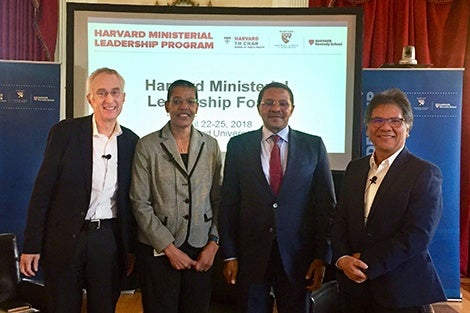At annual Harvard forum, government leaders trade ideas on financing health, education
May 2, 2017 – Finance and economic development ministers from nations in Africa, Latin America, and Southeast Asia recently gathered at Harvard for an intensive four-day program focused on ways that they can use their positions to accomplish policy and investment goals in human development.
The annual Harvard Ministerial Leadership Forum, held April 22-25, 2018 at Harvard’s Loeb House, is a collaboration of Harvard T.H. Chan School of Public Health, Harvard Kennedy School, and Harvard Graduate School of Education. It is led by faculty from the three schools and by a group of former and long-serving ministers from around the world.
The Forum, now in its seventh year, is not an academic exercise. Rather, it is practically-focused, with the aim of helping ministers develop a road map for accomplishing their goals. Their colleagues in health and education are invited to attend a second annual forum at Harvard held over the summer.
The response has been enthusiastic, said Executive Director Michael Sinclair. “Participants really respond to our call to explore possibilities for a transformative legacy in government.”
This year’s program featured a talk moderated by Harvard Chan School Dean Michelle Williams, focused on effective leadership in government. Keynote discussant H.E. Jakaya Kikwete, former president of Tanzania, was joined by Sir Michael Barber and Idris Jala, who formerly worked for the prime ministers of the UK and Malaysia, respectively.
Kikwete told participants about the Big Results Now (BRN) initiative he launched early in his presidency. It focused on “people-centered” projects in priority areas including agriculture, water, and education. As part of an effort to improve teaching quality, he published a ranking of all schools by their exam results. As a result, low-ranking schools began looking for ways to improve. BRN is also credited for improving access to water in the country.
Quoting his predecessor, Benjamin Mkapa, Kikwete said that he learned the hard lesson that “planning is to choose.” This can lead to many difficult decisions when you are faced with “unlimited wants but limited means.” He said that BRN was driven by a rigorous, data-driven process, and included the participation of his Cabinet early in the process.
Other sessions included a discussion around making policy choices to optimize the role of a large youth population in the economy, led by David Bloom, Clarence James Gamble Professor of Economics and Demography. Bill Hsiao, K.T. Li Research Professor of Economics, and Rifat Atun, Professor of Global Health Systems, discussed sustainable financing for health budgets.
Photo: Karima Ladhani
